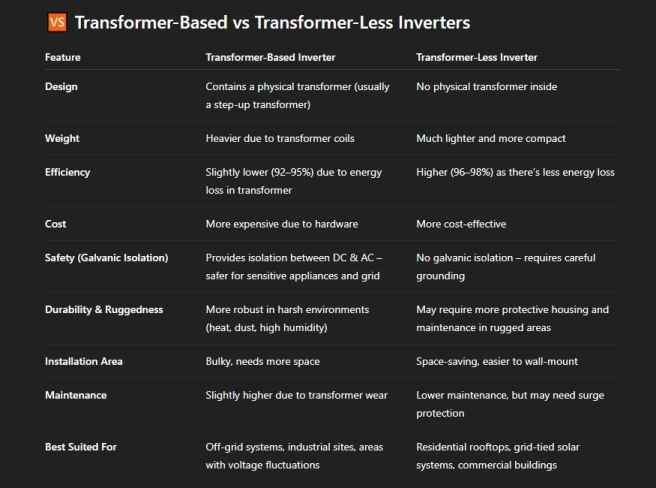
Here’s a complete guide comparing transformer-less inverters vs transformer-based inverters, designed to help you choose the right one based on your needs, application, and site conditions.
What Is an Inverter?
An inverter converts DC (Direct Current) electricity (like that from solar panels or batteries) into AC (Alternating Current) electricity, which is used by most home and industrial appliances.
There are two main types of inverters based on their internal architecture:
- Transformer-based inverters
- Transformer-less inverters

🔍 When to Choose a Transformer-Based Inverter
Choose Transformer-Based Inverter if:
- You need galvanic isolation for grid safety or appliance protection.
- You’re in a remote or rural area with rough weather or unstable voltage.
- You’re setting up an off-grid solar system or hybrid system with battery backup.
- You are powering sensitive medical or industrial equipment.
- If the Area Remains Above 32 32-degree Celsius on an avarage for most of the Days in a Year . As Heating Can be Controlled by Heat Sink and Cooling Fans Inside.
✅ Ideal for:
- Hospitals, schools, factories
- Rural solar systems
- Off-grid applications
🌟 When to Choose a Transformer-Less Inverter
Choose Transformer-Less Inverter if:
- You want higher energy efficiency and quick ROI (return on investment).
- You are in a well-developed urban area with reliable grid power.
- You want a compact, low-maintenance system.
- Your solar system is grid-tied without battery backup.
✅ Ideal for:
- Residential rooftops
- Urban commercial buildings
- Space-constrained installations
⚠️ Important Notes Before Buying
- Safety First: Transformer-less inverters require precise earthing and surge protection.
- Efficiency vs Isolation: Always weigh the trade-off between higher efficiency and safety (galvanic isolation).
- Grid Approval: Some countries or utility companies may mandate transformer-based systems for certain connections.
- Battery Use: If you are using batteries, transformer-based inverters are usually more compatible.
- Future Upgrades: If you plan to expand your solar system later, check whether the inverter supports modular growth.
🔚 So : Which One Should You Buy?
| Scenario | Recommended Inverter Type |
|---|---|
| Urban home with rooftop solar (grid-tied) | ✅ Transformer-less |
| Village school or rural clinic (off-grid) | ✅ Transformer-based |
| Commercial building with high efficiency goal | ✅ Transformer-less |
| Remote factory needing power backup | ✅ Transformer-based |
| Cost-sensitive small installation | ✅ Transformer-less |